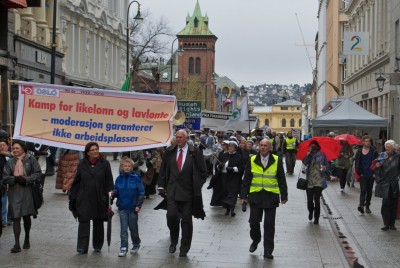Norwegian employers’ demands for a freeze on wages this year has been met by a corresponding call for an executive wage freeze by trade unions.

The Director General of the Confederation of Norwegian Enterprise (Næringslivets Hovedorganisasjon, NHO), John G Bernander, laid out his suggestion for a 0 percent pay rise following the first meeting of the annual national wage negotiations between himself, the Norwegian Federation of Trade Unions (Landsorganisasjonen, LO) leader, Roar Flåthen, and Prime Minister Jens Stoltenberg last Wednesday.
“The economic outlook, both domestically and internationally, means that we are compelled to go into the next few years with caution,” stated Bernander in newspaper Dagsavisen. “Every time real wages increase, Norwegian businesses and workplaces fail.”
In response, some trade union leaders have suggested that, by the same token, business leaders themselves should forego any wage increases. Tore Eugen Kvalheim of the Confederation of Vocational Unions (Yrkesorganisasjonenes Sentralforbund, YS), a rival union association to LO, said that “in order that the Norwegian wage system has legitimacy, it is very important that the leaders also take a joint responsibility for what kind of wage increase they want to have.”
Research suggests that Norwegian workers earn on average 43 percent more than those in countries with which Norway principally trades, with industrial workers earning 57 percent more than their counterparts in nations such as Germany and Sweden. Furthermore, real wages in Norway have increased 28 percent between 1999 and 2009.
NHO’s demands are not new, according to researchers at the Fafo Research Foundation. Indeed, employers asked for wage freezes in the 1990s, and there was no growth in both 1985 and 1987. A Fafo spokesperson believes that LO will at the very least negotiate to peg wage increases to price increases, as well as demanding further improvements for its lowest-paid members.
LO leader Flåthen commented that “it seldom happens that the starting point in negotiations becomes the result.” He defended earlier pay raises, saying “while almost all others have had recessions, we are probably the only country in the world that has had purchasing power increases during the financial crisis. We have nothing to be ashamed of, we have earned the wage increases.” While acknowledging that problems in Europe could affect demand and promising to “work to accomplish a sensible pay settlement that places emphasis on high employment and a stable economy,” Flåthen rejected the idea that this means workers “cannot receive a central wage increase.”
LO representatives will meet on March 22 to decide its negotiating guidance, but positions that remain from last year include demands to restore full employment and ensure equal wages.
Views and News from Norway/Aled-Dilwyn Fisher
Join our Forum if you’d like to comment on this story.

